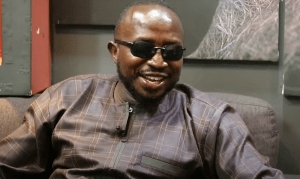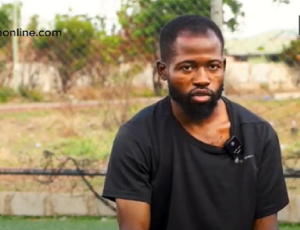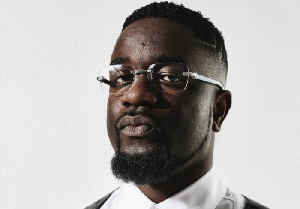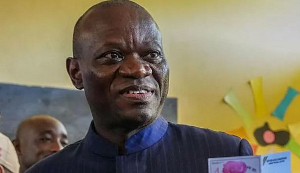By Dr. Michael J.K. Bokor
E-mail: mjbokor@yahoo.com
March 23, 2010
The rumpus that has been provoked by the Asantehene’s outbursts in response to the problem between the Techimanhene and the Tuobodomhene still rages on. Some of us have written on it and attracted vain threats and misplaced anger from his apologists. In a frontal attack on me, Yaw Opare-Asamoa entitled his tunnel-vision article as “Truth, Facts, and Objectivity” as if he doesn’t know that knowledge is always situated and that there can’t be anything like “Truth” or “Objectivity” in human discourse. Afreh Manu Bernard turned his into a laughable mess with the question “Is the Techimanhene also a Ghanaian?” which speaks volumes for his juvenile mindset.
I am compelled to respond to their vain threats. But first, let me thank the management of Ghanaweb.com, JoyFm Online, and modernghana.com for providing us the medium in cyberspace through which to let out our feelings instead of harbouring them to explode in communal violence and tear our country apart. Lack of avenues for the release of such pent-up feelings could be constraining. Misusing this forum to whip up ethnic sentiments is, however, dangerous. That’s why I want to clarify my stance within the context of the two writers’ rejoinders.
I wouldn’t have bothered to respond to those rejoinders but for the fact that the crisis associated with this chieftaincy problem has refused to abate and new ones are erupting to endanger well-being. Day-in-day-out, we continue to hear pronouncements from people, which suggests that the matter can’t easily be swept under the rug. It has to be exhausted and a new direction carved for national (not tribal) aspirations.
I begin with a response from one Yaw Atta on JoyFm Online, which sums up the rationale behind the stance taken by some of us against the Asantehene’s threatening utterances: “If a dog bites you, do you (the human being) also threaten to bite the dog back? Who is more stupid in this case?”
Granted that the remote cause of the current crisis between the Techimanhene and the Asantehene is rooted in history, what has happened in the full glare of publicity warrants public concern. The Asantehene rushed out of the bathroom in chase of the “mad man” who had snatched his underwear instead of staying back to wrap himself with his towel first. Exposing himself thus, what do you expect people to say? Praise him?
If the Asantehene seeks the welfare of those territories and people whose allegiance he loves to revel in, why hasn’t he been able to resolve the Kumawu chieftaincy dispute, which is in his own backyard? Rather ironically, Kumasi is closer to Manhyia Palace than Tuobodom or Techniman.
The two “Ahenfie Scholars” (Opare-Asamoa and Afreh) have written to take issue with me from various angles, particularly the one based on history. They accused me of not knowing the history behind Techiman and Asanteman. Again, they doubted my intellectual abilities, claiming that I had introduced politics into the matter as if they thought holding a Ph.D. necessarily made me a-political. What are we, human beings, if not political animals?
For the avoidance of all doubts about my rhetorical agenda in that article, let me state aboveboard that I didn’t set out to write on history. My aim was simple: to draw the Asantehene’s attention to the damaging implications of his open and unguarded outbursts. Historical allusions or accounts have no place in such a rhetorical manouevre. The immediate impact of those pronouncements made any recourse to history puerile and irrelevant. The house was burning and one needed to quench the fire, not look for what caused it.
I will not waste anybody’s time trying to direct attention to what we all already know as the remote and immediate causes for this problem. But I am tempted to opine that what we have heard from the Asantehene and those who think like him is psychogenic and dangerous to peaceful social cohesion. I am all the more concerned by the treachery of Opare-Asamoa and Afreh to suggest that by criticizing the Asantehene, people like us were disparaging the entire Asante ethnic group.
This is where their problem lies. They construct the Asantehene as everything Asante and can’t single him out from themselves or their entire Asante ethnic group as an individual to whom perfection is not a human quality. By lumping everything together this way, they have only a tunnel vision of him and themselves. They construct the problem as an ethnic one and will, therefore, quickly find justification for vain threats against people who see things otherwise, and suggest that any effort to point out their Asantehene’s wrongdoing is a frontal attack on the entire Asante ethnic group. By such means, they whip up bitter sentiments and pit the Asantes against all others. Such is the myopic perspective of these Ahenfie scholars. Pathetic captives of poisonous ethnic sentiments!
But I part companies with them on that score, knowing very well that a good thing sells itself. I don’t dispute the fact that the position of an Asantehene is “powerful” but I am careful enough to separate that office (the shell) from the person who occupies it. Both are not the same. Thus, in criticizing the occupant of the Golden Stool for making pronouncements that had the potential to inflame passions and provoke internecine tribal warfare, I did not seek to undermine that shell or Asante ethnicity. I focused on the individual.
We are told that the Asantehene is powerful and wealthy. And so what? Yes, we don’t dispute that claim. But we are not amused by it because with all that wealth, he doesn’t feed us. When he sits down to enjoy the comfort of his office, including eating his favourite FUFU and “BOFORO” (soup flavoured with grasscutter-shit), I don’t join him. He eats it and shits it out alone. Why, then, should I be bothered by claims of his wealth and power? On the contrary, I will be bothered if after satisfying himself with the sweetness of his office, he comes out to stir up social unrests.
If these apologists really knew their Asante history, they would hesitate in making such unguarded utterances and issuing threats against people seeking to set them right. History is not on their side. Here is an unforgettable example. By the 17th century, their instinctive desire for notoriety as a war-loving group had led them on rampaging escapades into other tribes’ territories. Their pathological love for warfare endangered social cohesion and tore apart territories.
The internecine tribal warfare between their forebears and the Denkyira people and Fantes, among others, has its dark side, which the historians have recorded. Again, have they paused to find out why Nana Kwantwi Barima, ex-Adansihene, took away Adansiman from the control of the Asantehene in the 1980s and 1990s? No one likes to be controlled forever, especially when there are opportunities for freedom.
Let me tell these Ahenfie scholars in a simple language to understand that it was this same spirit of belligerence that led to the untimely death of the one whose name this current Asantehene bears. Nana Osei Tutu I got drowned in the Pra River (somewhere near Twifo Praso) because he allowed himself to be consumed by imperial ambitions and hatred for other tribes, and ventured into territories whose terrain he hardly knew anything about. Because the gods wanted to kill him, they first made him mad. When such a spirit of belligerence dominates someone, it leads to death, not life.
Your Asantehene has embarked on a similar venture and has to pause to rethink his ways of seeking vengeance. In this 21st century, what he has put in motion will have a huge boomerang effect on him and whatever he represents. Who does he think he is?
Again, these apologists should remember that before Kwaku Duah Bonsu became the Asantehene slightly more than 10 years ago, we knew who he was. Having been enstooled as the Asantehene, we know who he is. Without the shell of the “Asantehene,” he would have remained Kwaku Duah Bonsu and all that we’ve known him to be. It’s just like a bird that is ordinary without its beautiful feathers.
That is the more reason why he shouldn’t allow the fortunes of his status to blind him to reality. He is advised to tread cautiously. His followers like these apologists are equally advised not to overstep bounds. The consequences will not be palatable. What more do they need to be told before they listen to reason?
Indeed, Ghana’s main problem today is what to do with the institution of chieftaincy. All over the country, chieftaincy problems have become a blight on the people’s hopes. If it is not a struggle for occupancy of a stool, then, it is the fraudulent sale and re-sale of stool lands by chiefs to needy people. Chieftaincy has caused too many problems for us. There is too much rot in that institution, which is fast making chiefs the object of public disdain and reducing the institution itself into an anathema.
Gradually, modern institutions of governance are eroding the very basis of the chiefs’ power and authority, which means that the institution of chieftaincy will eventually be overtaken by events. That is why the chiefs or adherents of that institution must recognize that by their constant acts of misconduct, they are facilitating the demise of that very institution. It is now at a moribund stage. We know that traditions die hard but when they die, they die forever. If even they resurrect, they do so as different things—for weal or for woe. Parading himself as a “powerful” person shouldn’t have any place in a democracy. That is the very “strongman” mentality that the US President Barack Obama has admonished us aon. For as long as some deceive themselves that without them, there will be no Ghana, the situation will be dire. And when such air-filled “strongmen” arouse our anger, we will jump on them, not cower before them. It is for this purpose that we have to work hard to ensure that the institutions of state that are to take care of our lives are strengthened and resourced to perform their functions and render useless those anachronistic ones based on unproductive customs, personality cults, and slavish allegiance to fiefdom (wrongly called “kingdom” by the Ahenfie scholars).
As these formalized institutions of state take firm root, chieftaincy will recede to the shadows and the chiefs and queenmothers will automatically become fanfare materials representing relics of the past. Like dying donkeys, they may choose to kick the hardest but all will end in vain. Death is inevitable for institutions that lose the capacity to regenerate themselves. Our chieftaincy institution has pushed itself into the throes of gradual death.
Chieftaincy thrives on intimidation and arm-twisting. However, in the 21st century system of governance, no one should allow himself to be subjected to such an ordeal or recourse to vain words labelled as “traditional oath” (whether in deference to any so-called River God or artefacts). Our constitution is paramount and should take care of errant behaviour. We have only one country to belong to.
Yes, chieftaincy has been an integral part of our existence but if we allow it to fester into a paralyzing adulation and allegiance to this “strongman” mentality, it will continue to be our bane. When people elsewhere are doing everything possible to invent materials to make life comfortable for them and worth living (of course, that’s why their health care delivery system and other life-support agencies are continuously being retooled), some in Ghana are bent on projecting and protecting petty ethnic sentiments woven around “strongmen.” Sadly, we have allowed such sentiments to becloud our sense of urgency for far too long and fail to do what will improve living standards despite the abundant natural and human resources that we have. It is a disgrace that those loudly blowing the horns of worn-out institutions are the very people leading our political parties. How can we make any progress with such characters at the helm of affairs?
The Asantehene must not allow the shell he occupies to dominate his life and use it to promote his ambitions. After all, the shell he occupies is an old one with its own checkered history. We know that he is a tiger; but does he have to go out to declare his tigritude and what he can do with his sharp paws and frightening canine? We already have too many problems to lose sleep over. He shouldn’t add to them.
History tells me that at the height of the British torment, it was not the Asantehene who took the initiative to confront the colonialists. It was a Queenmother (Nana Yaa Asantewaa of Ejisu, not Manhyia Palace) who did so to give us the historically epochal memory of the Yaa Asantewaa War (1900 to 1901). Where were the men, then? Are they now emerging in this 21st century to cause war when the condition is ripe for peace? Those who want to test the depth of a stream with both legs must be prepared to swim. The stream is beckoning and we shall soon see who the swimmers are. I rest my case.
Opinions of Wednesday, 24 March 2010
Columnist: Bokor, Michael J. K.














